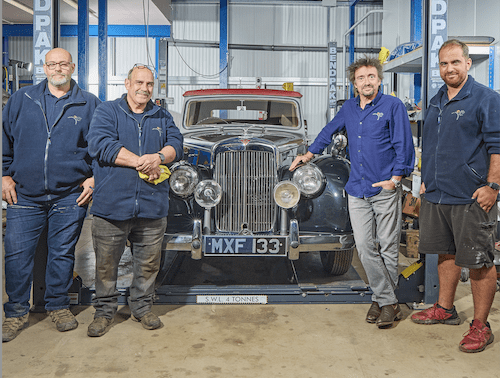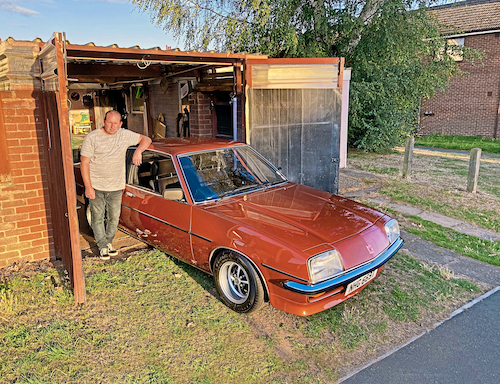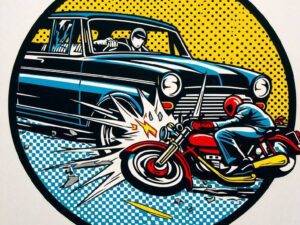Richard Hammond on how he restored this stunning 1952 Alvis TA21 drophead

Fresh from the pages of Practical Classics Magazine, we meet TV’s Richard Hammond, who along with the help of a few friends has restored a stunning 1952 Alvis TA21 drophead and Keith Jones, who bought and restored a Harvest Gold Cavalier Coupe GLS, just like his dad used to own.
As a specialist classic car insurance broker, we love seeing old cars being restored to their former glory, which is why we’ve linked up with Practical Classics to bring you two fantastic stories each month for you to digest and take as inspiration for your own classic rebuilds.
Restoring a 1952 Alvis TA21 drophead with Richard Hammond
Words by Danny Hopkins and Pictures by Matt Howell
On the outskirts of Hereford sits a faceless, humble unit. Faceless save for a name, and humble only in appearance, the unit is home to the dreams and aspirations of a family restoration business and one of the planet’s most recognisable ‘car guys’.
“It’s still all a bit new,” says Richard Hammond as he opens the door to reveal the inside space of The Smallest Cog, the professional workshop he has created with working partner Neil Greenhouse. “But my heart has always been in this. My grandad was a coachbuilder.
“He started as a cabinet maker, went to Mulliners – who, incidentally, made the bodies for the saloon version of the TA21 – and ended up at Jensen Motors through to 1974, so craftsmanship has always been important to me. Restoration really is in my blood, and my passion has always been with classics.”
As Richard introduces me to the team – the Cogs – I notice a whiff of fatigue. “Yes, well, the chaps were up until 4am getting the car finished,” says Richard as he introduces me to business partner Neil Greenhouse, Neil’s son Anthony and brother Andrew. Richard himself was also on hand into the small hours in readiness for our visit as he was ‘sweeping up.’
The impression you get is the pain is real… and the passion… and for that matter, the teamwork. “It’s a cooperative really,” says Neil. The quality the Cogs Cooperative produces is certainly real, as Richard and Neil pull back the cover to reveal a stunning 1952 Alvis TA21 drophead. This is a car that has been subject to a full but sympathetic restoration having only come in to be ‘lightly recommissioned’ in November 2022.
“It belongs to a friend of mine, Michael Fenton, and I have known the car for decades,” says Neil. “I was the last person to work on it before Michael parked it up in a barn in 2001. So, today will be the first time this TA has been on the road, under its own power, for 22 years.”
No false jeopardy here then, I can see it in their eyes. All of this is subject to visual record by a TV film crew, who are seemingly ever present. There’s no doubt the show they produce, Richard Hammond’s Workshop, has galvanised the process and progress of the restoration work undertaken by the Cogs, but that doesn’t take away from the fact that the workshop is a working space and the guys have struggled hard to make sure the Alvis is ready for our arrival.

Anyone who has ever restored a classic knows, it is always going to be a tortuous journey. “As with most restoration work on cars like this, the bodywork has taken up a lot of our time,” Neil explains, “It had sustained damage on the driver’s side and was a bit off square so we decided to take the body apart. And of course that meant, as we looked into it, we kept finding nasty little problems.”
“We ‘shot-blasted’ the panels and that revealed the worst of it,” says brother Andrew. “The wings needed a lot of work. The car had previously received a ‘Seventies’ restoration and there was a lot of varied metal in there all rod welded, badly, together. Half made and then filled over the top. We didn’t really estimate for that. The spare wheel holder was glass fibre over layers and layers of old metal. It was like a patchwork quilt.”
So, the team had to remake a lot of the panel work, including use of the workshop’s English wheel… so much for a light recommission. “Anthony had a nightmare with the engine, too,” says Richard, “All the owner originally wanted was a refresh and upgrade to negative earth, electronic ignition, electric fan and alternator.”
“Indeed it was a nightmare,” says the younger Greenhouse, with a slightly haunted look. “It had come in just to be put back on the road and the engine was running when it was laid up in 2001. So, when I filled it with water to see if it could run again, and the water immediately ended up on the floor, I feared the worst. The core plugs had popped, so I was expecting a cracked block, but we got away with a partial rebuild. The head still needed to be laser welded because there were cracks in the valve seats but we could have been looking at a terminal situation.”
With that done it was time for Anthony and Andrew to apply the paint in the Smallest Cog’s 21st century booths. “It’s a bit better than our old place,” says Neil. “It was silver when it came in, but we convinced owner Michael to go for a two-tone colour scheme… they are both Mercedes tones, but don’t judge it yet because we haven’t cut it back!” The paint finish looks excellent.
“We took all of the panels off to paint them of course,” adds Andrew, ?Including the doors. Which was a nightmare to re-hang, particularly the driver’s side, thanks to the rectified accident damage. It took Neil several days to get it right.”
“In the end I had to manipulate the way the brass door hinges sat and opened, to make the door sit on the right plain” Neil explained.
The panel gaps look bang on now. From every angle it’s a good car but one that feels like a ‘user’ as well as a show pony. “It was tired old wiring that took it off the road in 2001, so we have fitted a complete new loom, upgraded for the alternator and the other bits. Autosparks made it, it’s great that we have an industry around us to make this new kit for old cars.”
It is also another sign this car is restored for use… it will be driven and won’t end up a concours queen. Which is as good a cue for a drive as I have ever heard.
Richard is full of praise, “Michael has got a fantastic job for his money. It’s a coachbuilt car and comes with all in built expense that coachbuilt cars have. Michael is also a friend of Neil’s, so it’s had an extra element. It’s been an adventure and it has been great watching the guys take it on.”
A four o’clock in the morning finish does not take away from the obvious pride the Cogs feel for the car they have revived. Proof that despite the professionalism and the business side of things, all of them are enthusiasts at heart, with soul.
Read the full version of how this 1952 Alvis TA21 dropheead was restored on the Practical Classics page.
Locating and duplicating my dad’s beloved Harvest Gold Cavalier Coupe GLS
Words Pictures by Danny Hopkins

Like many of us, my story starts with my dad. He bought a Harvest Gold Cavalier Coupé GLS back in 1976, and I have been on the hunt for one since I passed my driving test in 1995. That included mounting a nationwide hunt to find my dad’s actual car.
The search sadly yielded a response from the breaker who, as it turns out, crushed it in 1992. So, I moved on to plan B, to find one just like my dad’s.
It only took about an hour! Just after finding out about the demise of dad’s car, I got a message from a bloke on one of the Facebook groups I had been searching through, asking if I wanted to buy his car. It was a Harvest Gold Cav Coupé auto, (not manual, sadly), but I still said I would have it.
Two days later it was delivered to my friend Steve Horton’s workshop from Leeds on a trailer. It needed a lot of work… I mean a lot. From front to back I had to replace the lower front valance, front flinches, battery tray, front chassis legs, A-post bottoms, jacking points, sills, chassis rails at the back, inner sills, wheelarches (in three sections on one side, four on the other), the bottom of the rear scuttle, rear corners, new bonnet, new boot and… the entire roof panel.

It had a horrible Eighties sunroof that had sunk down, so I found a new roof panel and welded it on, having carefully drilled out the original spot welds (early Cav roofs were all spot welded). I am a self-taught welder and the bodywork took me and my MIG twelve months of solid graft.
Oh, and I had to source body panels from around the world – I went through four bonnets until I found one that was good enough, and I rejected two sets of wings. It was like a full-time job, to go with my other full-time job working for JLH, Jonathon Heap in Southam.
I then painted the shell myself, turning my shed into a booth with all the correct PPE and ventilation kit. I took everything back to bare metal, epoxied and stone chipped underneath, seam sealed everywhere and spent ages readying it for top coats. I panel- gapped it all on the car, then applied the base coat and lacquer.
Once the shell was sound and painted I re-did the entire suspension, which was shot blasted and epoxied, given new bushes and lowered by 60mm. Then I pulled the engine apart and began the process of refurbishing and replacing everything. I serviced the auto ’box and it was good… I found the seats in Leek, the door cards in Wales and the binnacle, carpets and parcel trays came from various mates.
Steve and I fitted the engine and box, which went in a treat. It was all good – apart from the ‘oh, no’ moment when it was delivered, it all went to plan… Steve was expecting me to do it quite quickly and get it on the road, but I am a bit of a perfectionist so it took two years of graft.
It was very nerve-wracking starting it up. It wouldn’t start because the dizzy was 180 degrees out – but then it ticked over beautifully. Once we topped it up with ATF it went like a dream. It was very emotional – I can see why the old man loved his.
Read the full version of how Keith managed to locate and restore his Harvest Gold Cavalier Coupe GLS on the Practical Classics page.






